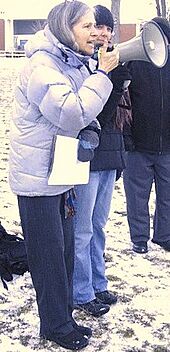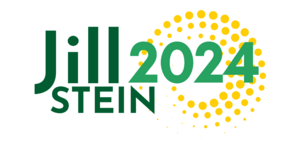Jill Stein facts for kids
Quick facts for kids
Jill Stein
|
|
|---|---|
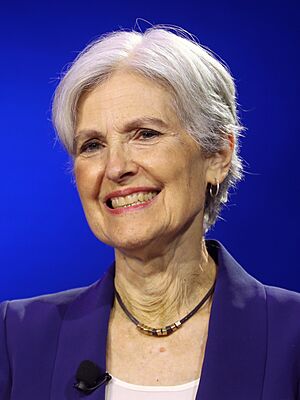
Stein in 2024
|
|
| Member of the Lexington Town Meeting from the 2nd Precinct |
|
| In office 2005–2010 |
|
| Personal details | |
| Born |
Jill Ellen Stein
May 14, 1950 Chicago, Illinois, U.S. |
| Political party | Green (2002–present) |
| Other political affiliations |
Democratic (1968–2002) |
| Spouse | Richard Rohrer |
| Children | 2 |
| Education | Harvard University (BA, MD) |
| Signature | |
Jill Ellen Stein (born May 14, 1950) is an American doctor and activist. She is known for being the Green Party's candidate for President of the United States in the 2012, 2016, and 2024 elections.
As a doctor, Stein cared about how the environment affects people's health. She first ran for governor of Massachusetts in 2002 and again in 2010.
Stein ran for President of the United States in 2012 with Cheri Honkala as her running mate. She ran again in 2016 with Ajamu Baraka. In 2017, her campaign was looked into for possible connections with the Russian government, but she was cleared of any wrongdoing.
She ran for president a third time in the 2024 election. Her campaign focused on being against war, supporting universal healthcare, free public education, and a "real Green New Deal" for the environment. She also supported strong worker rights. Her running mate was Butch Ware. Jill Stein is one of several women who have run for president in the U.S. She is also one of the few who received more than a million votes.
Contents
Early Life and Education
Jill Ellen Stein was born on May 14, 1950, in Chicago, Illinois. She grew up in Highland Park, Illinois. Her father was a lawyer, and her mother stayed at home to care for the family.
In 1973, Stein graduated with honors from Harvard College. She studied psychology, sociology, and anthropology. She then went to Harvard Medical School and finished in 1979. Stein worked as a doctor in the Boston area for 25 years. She also taught internal medicine at Harvard Medical School.
Early Activism and Political Career
As a doctor, Jill Stein became worried about how people's health was connected to the environment. This led her to become an activist. In 1998, she started protesting against "Filthy Five" coal plants in Massachusetts.
Stein has said she left the Democratic Party and joined the Green Party because she felt the Democratic Party stopped important changes to how political campaigns are funded. She believes the Green Party offers a different choice from the two main parties. She sees both main parties as serving wealthy groups and being involved in wars.
In January 2024, Stein spoke at a rally in New York. She encouraged people to protest against what she called the "American Empire" and Israel. She also supported the student protests that were happening.
Political Campaigns
2012 Presidential Campaign
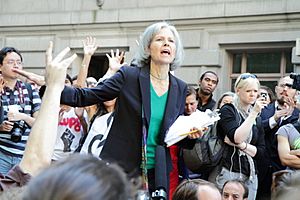
Stein started her campaign in October 2011. She suggested a "Green New Deal" plan to create many jobs. In July 2012, she officially became the Green Party's candidate for president. She chose Cheri Honkala, an activist who works to help people in poverty, as her running mate.
During her campaign, Stein was arrested several times for protesting. For example, she was arrested at a bank protest against home foreclosures. She was also arrested for trying to enter a presidential debate site to protest that smaller parties were not included. Later, she was arrested in Texas for protesting the building of an oil pipeline.
2016 Presidential Campaign
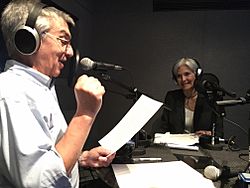
On February 6, 2015, Stein announced she was thinking about running for president again. She officially announced her candidacy on June 22. She chose human rights activist Ajamu Baraka as her running mate.
Stein said that the Democratic and Republican parties are "two corporate parties." She believed that putting another Clinton in the White House would make right-wing extremism worse.
In September 2016, a judge in North Dakota issued a warrant for Stein's arrest. This was because she spray-painted a bulldozer during a protest against the Dakota Access Pipeline. She was charged with minor crimes. Stein said she would work with the authorities. She defended her actions, saying she felt it was important to support the Standing Rock Sioux people. In August 2017, she pleaded guilty to a minor charge and was put on probation for six months.
Recount Fundraising
In November 2016, some experts raised concerns about the election results in three states: Wisconsin, Michigan, and Pennsylvania. They wanted a recount of the votes. They asked Stein to lead this effort, and she agreed.
A fundraising campaign was started to pay for the recounts. It quickly raised millions of dollars. Stein filed for a recount in Wisconsin. She also planned to do the same in Michigan and Pennsylvania. However, these efforts faced legal challenges and were eventually stopped by courts.
Election Investigation
In December 2017, the Senate Intelligence Committee looked into Stein's 2016 campaign. They wanted to see if there was any "collusion with the Russians." Stein's campaign said they would work with the investigators. The Committee later cleared Stein of any wrongdoing.
Reports in December 2018 said that a Russian group used social media to support Stein's campaign. This was part of an effort to take votes away from Hillary Clinton and help Donald Trump. However, there was no evidence that Stein knew about this operation. Stein had also been criticized for sitting at the same table as Russian president Vladimir Putin at an event in Moscow. Stein said she went to the event hoping to talk to Putin about important issues.
2024 Presidential Campaign
Stein first supported another candidate, Cornel West, for the Green Party's nomination in 2024. She even became his campaign manager. But after West decided to run as an independent, Stein withdrew her support.
On November 9, 2023, Stein announced she would run for president for the third time. She said the two-party political system was "broken." She wanted to focus on issues like supporting workers, ending wars, and dealing with climate change.
Stein has also been very critical of U.S. foreign policy, especially regarding the Israeli-Palestinian conflict. She has spoken out against Israel's military actions in Gaza. Her campaign platform supports an "Economic Bill of Rights." This includes rights to a living wage, housing, healthcare, education, and clean water.
Political Positions
Economy and Jobs
In her 2024 campaign, Stein suggested an "economic bill of rights." This idea means that things like jobs, healthcare, housing, food, and education should be considered basic rights for everyone.
She has also talked about making changes to how banks are regulated. She supported a small tax on financial trades and increasing the tax on large inheritances. Stein also wanted to make the Federal Reserve more public and create non-profit banks.
Education
Stein does not support charter schools. She has also criticized the Common Core education standards. She believes that teachers, not companies, should be in charge of education.
Debt Forgiveness
Stein supports canceling all student loan debt. She believes this could be done without raising taxes, similar to how the government helped Wall Street in the past.
Electoral Reform
Stein is critical of the two-party system in the U.S. She supports ranked-choice voting. This system allows voters to rank candidates in order of preference. She also wants to change campaign finance rules.
Energy and Environment
Stein believes that climate change is a "national emergency." She calls it a threat even bigger than World War II.
She supports a national ban on fracking. This is a method used to get oil and gas from the ground. Stein believes it is as harmful as coal. She also speaks against nuclear energy, saying it is "dirty, dangerous and expensive."
Stein has said that switching to 100% renewable energy by 2030 would save money on healthcare. She believes it would lead to fewer illnesses and deaths.
Foreign Policy
Stein has criticized the United States for its "expanding wars." She said that the U.S. was bombing several countries.
Israel and Palestine
Stein has long supported Palestine. Her 2012 campaign was against Israel's control of the West Bank. She called for a boycott of Israel. In 2016, she said the U.S. should stop giving aid to Israel.
Stein has said that Israel is committing genocide against Palestinians in the 2024 Gaza war. She believes both Democrats and Republicans are helping this by giving military aid to Israel.
Military Spending
Stein wants to cut U.S. military spending by at least 50%. She also wants to remove U.S. nuclear weapons from other countries. Stein has strongly criticized the use of drones, calling them a human rights violation.
She believes the U.S. should only use force when there is a clear and immediate threat of attack. She has criticized U.S. involvement in wars like the 2003 invasion of Iraq and the War in Afghanistan.
NATO
Stein believes that military treaties like NATO need to be reviewed. She has accused NATO member Turkey of supporting ISIS.
Russo-Ukrainian War
In 2015, Stein said that NATO was "encircling Russia." She suggested that a neutral Ukraine would help Russia feel less threatened. She also claimed that the U.S. helped cause a coup in Ukraine in 2014.
In 2024, when asked if she considered Vladimir Putin a "war criminal," Stein first avoided directly answering. She later posted a statement on her social media describing Putin as a war criminal.
Other Views
Stein believes the U.S. should not get involved in territorial disputes in the South China Sea. She supported Brexit in 2016, seeing it as a rejection of political elites. After the death of Fidel Castro, she called him a "symbol of the struggle for justice."
Public Health and Vaccines
Stein supports replacing the Affordable Care Act (Obamacare) with a "Medicare for All" healthcare system. She has also criticized unhealthy food products and the advertising that promotes them.
GMOs and Pesticides
Stein supports labeling GMO foods. She wants a pause on new GMOs and a gradual removal of existing ones. This is unless independent research proves they are not harmful. She has said that the studies on GMOs are not good enough.
Some people have criticized Stein's statements about GMOs. They say her views go against what most scientists agree on, which is that existing GMO foods are safe.
Vaccinations
When asked if vaccines cause autism, Stein first said there was no evidence. She later changed her statement to say she was "not aware of evidence linking autism with vaccines."
Scientists have said it is risky for candidates to be unclear about vaccines. Stein has said that vaccines are "absolutely critical" for preventing many diseases. However, she also mentioned concerns among doctors about vaccine schedules and substances like mercury that used to be in vaccines. She believes vaccines should be approved by a board that people can trust.
Race Relations
Stein has spoken out against what she calls structural racism in the U.S. justice and prison systems. In 2016, she called for reparations for slavery.
She has supported the Great Sioux Nation's opposition to the Dakota Access Pipeline. In September 2016, she joined protesters in North Dakota.
Space Exploration
In 2012, Stein wanted to slightly decrease spending on space exploration. However, in 2016, she said that NASA funding should be increased. She argued that cutting the military budget could free up money for "exploring space instead of destroying planet Earth."
Whistleblowers
In her 2016 acceptance speech, Stein called for an end to the "war on whistleblowers." She wanted to free people like Chelsea Manning, Julian Assange, and Edward Snowden. She even said she would have Snowden in her cabinet if she were elected. Stein believes whistleblowers are doing what other journalists should be doing.
Electoral History
2005 Lexington Town Meeting
In 2005, Stein ran for the Lexington Town Meeting, which is the local law-making body in Lexington, Massachusetts. She was elected to one of seven seats and finished first among 16 candidates. She was reelected in 2008 but resigned during her second term to run for governor again.
2002 Governor of Massachusetts
Stein ran as the Green-Rainbow Party candidate in the 2002 Massachusetts gubernatorial election. She received 76,530 votes (3.5%).
| Massachusetts gubernatorial election, 2002 | |||||
|---|---|---|---|---|---|
| Party | Candidate | Votes | % | ±% | |
| Republican | Mitt Romney | 1,091,988 | 49.18% | ||
| Democratic | Shannon O'Brien | 985,981 | 44.40% | ||
| Green-Rainbow | Jill Stein | 76,530 | 3.44% | ||
| Libertarian | Carla Howell | 23,044 | 1.04% | ||
| Independent | Barbara Johnson | 15,335 | 0.69% | ||
| Write-in | 1,301 | 0.07% | |||
| Blank | 26,122 | 1.17% | |||
| Total votes | 2,220,301 | 100.00 | + 4.04 | ||
2006 Secretary of the Commonwealth
In 2006, Stein was nominated for Secretary of the Commonwealth. She received 353,551 votes (17.7%).
| Secretary of the Commonwealth election, 2006 | |||||
|---|---|---|---|---|---|
| Party | Candidate | Votes | % | ±% | |
| Democratic | William Francis Galvin | 1,638,594 | 82.0% | ||
| Green | Jill Stein | 353,551 | 17.7% | ||
| Total votes | 2,243,835 | 100.00 | |||
2010 Governor of Massachusetts
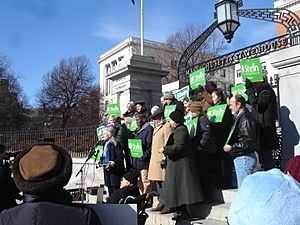
On February 8, 2010, Stein announced she would run for governor again. Her running mate was Richard P. Purcell. She finished fourth, receiving 32,895 votes (1.4%).
| Massachusetts gubernatorial election, 2010 | |||||
|---|---|---|---|---|---|
| Party | Candidate | Votes | % | ±% | |
| Democratic | Deval Patrick (incumbent) | 1,112,283 | 48.42 | ||
| Republican | Charlie Baker | 964,866 | 42.00 | ||
| Independent | Tim Cahill | 184,395 | 8.03 | ||
| Green-Rainbow | Jill Stein | 32,895 | 1.43 | ||
| Write-in | All others | 2,600 | 0.11 | ||
| Total votes | 2,297,039 | ||||
2012 President of the United States
Stein received 469,015 votes (0.36%). This was the most votes any woman presidential candidate had received up to that time.
| Party | Candidate | Votes | % | |
|---|---|---|---|---|
| Democratic | Barack Obama / Joe Biden (inc.) | 65,915,795 | 51.1% | |
| Republican | Mitt Romney / Paul Ryan | 60,933,504 | 47.2% | |
| Libertarian | Gary Johnson / Jim Gray | 1,275,971 | 1.0% | |
| Green | Jill Stein / Cheri Honkala | 469,627 | 0.4% | |
| Constitution | Virgil Goode / James Clymer | 122,389 | 0.1% | |
| Peace and Freedom | Roseanne Barr / Cindy Sheehan | 67,326 | 0.1% | |
| Justice | Rocky Anderson / Luis J. Rodriguez | 43,018 | nil | |
| American Independent | Tom Hoefling / J.D. Ellis | 40,628 | nil | |
| Reform | Andre Barnett / Kenneth Cross | 956 | nil | |
| N/A | Other | 216,196 | 0.2% | |
| Total votes | 129,085,410 | 100% | ||
2016 President of the United States
Stein received 1% of the national popular vote in the election. She finished in 4th place with over 1,457,216 votes (1.07% of the popular vote).
| Party | Candidate | Popular votes | % | Electoral votes | |
|---|---|---|---|---|---|
| Republican | Donald Trump / Mike Pence | 62,985,828 | 46.09% | 304 | |
| Democratic | Hillary Clinton / Tim Kaine | 65,853,514 | 48.18% | 227 | |
| Libertarian | Gary Johnson / Bill Weld | 4,489,233 | 3.28% | 0 | |
| Green | Jill Stein / Ajamu Baraka | 1,457,222 | 1.07% | 0 | |
| Independent | Evan McMullin / Mindy Finn | 731,788 | 0.54% | 0 | |
| Others | 1,152,671 | 0.84% | 0 | ||
| Total | 136,669,237 | 100% | 538 | ||
2024 President of the United States
| Party | Candidate | Popular votes | % | Electoral votes | |
|---|---|---|---|---|---|
| Republican | Donald Trump / J.D. Vance | 77,302,580 | 49.80 | 312 | |
| Democratic | Kamala Harris / Tim Walz | 75,017,613 | 48.32 | 226 | |
| Independent | Robert Kennedy Jr. / Nicole Shanahan | 756,393 | 0.49 | 0 | |
| Green | Jill Stein / Butch Ware | 862,049 | 0.56 | 0 | |
| Others | TBA | TBA | |||
| Total | TBA | TBA | |||
Personal Life
Jill Stein is married to Richard Rohrer, who is also a doctor. They live in Lexington, Massachusetts, and have two sons.
In the 1990s, Stein sang in a folk rock duo called Somebody's Sister. They released three albums: Somebody's Sister (1995), Green Skies (1997), and Circuits to the Sun (1999).
See also
 In Spanish: Jill Stein para niños
In Spanish: Jill Stein para niños
 | Emma Amos |
 | Edward Mitchell Bannister |
 | Larry D. Alexander |
 | Ernie Barnes |


